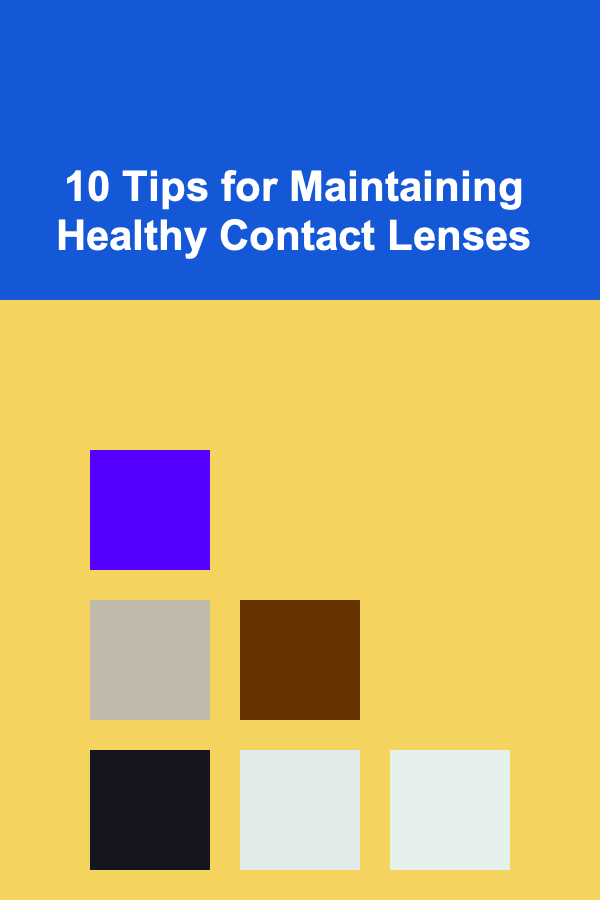
10 Tips for Maintaining Healthy Contact Lenses
ebook include PDF & Audio bundle (Micro Guide)
$12.99$11.99
Limited Time Offer! Order within the next:

Contact lenses are a popular and convenient alternative to eyeglasses, providing clear vision without the need for frames. However, maintaining healthy contact lenses requires a commitment to proper care and hygiene. Poor maintenance can lead to discomfort, eye infections, or even long-term vision problems. In this article, we will explore ten essential tips for maintaining healthy contact lenses and ensuring your eyes stay comfortable and safe.
Clean and Disinfect Your Lenses Daily
One of the most important steps in contact lens care is cleaning and disinfecting your lenses daily. Contact lenses come into direct contact with your eyes, and as such, they can accumulate debris, bacteria, and other harmful substances that could lead to eye infections or irritation.
Cleaning Tips:
- Use proper solutions: Always use a cleaning and disinfecting solution that is specifically designed for contact lenses. Avoid using water, saliva, or homemade solutions, as they can introduce harmful bacteria into your lenses.
- Rub your lenses: Even if the solution claims to be "no rub," it's a good practice to gently rub the lens with your clean fingers to remove debris.
- Store lenses in a clean case: Make sure to store your lenses in a clean contact lens case and replace the case every three months to prevent bacterial buildup.
Replace Lenses as Recommended
Every type of contact lens has a recommended replacement schedule, whether daily, bi-weekly, or monthly. It is crucial to follow these schedules to avoid issues like discomfort, poor vision, and increased risk of infection. Wearing lenses past their recommended lifespan can cause the material to break down and harbor bacteria.
Replacement Tips:
- Stick to the recommended schedule: Adhere to the recommended wearing and replacement schedule outlined by your eye care professional and the manufacturer.
- Don't extend wear time: Even if your lenses feel comfortable, avoid wearing them longer than recommended, as this can deprive your eyes of oxygen and increase the risk of eye problems.
Wash Your Hands Thoroughly
Before touching your lenses, it is essential to wash your hands thoroughly with soap and water. Your hands can carry dirt, oils, and bacteria that could transfer onto your lenses, leading to eye infections or discomfort.
Hand Hygiene Tips:
- Use soap and water: Always wash your hands with soap and water before handling your lenses. Avoid using antibacterial soaps that can leave a residue.
- Dry with a lint-free towel: After washing, dry your hands with a lint-free towel to avoid transferring particles onto your lenses.
Avoid Water Exposure
Water can introduce harmful microorganisms into your contact lenses, increasing the risk of eye infections. Whether you're swimming, showering, or washing your face, it's important to avoid getting water in contact with your lenses.
Water Avoidance Tips:
- Remove lenses before swimming: Always remove your lenses before swimming, even in chlorinated pools, as bacteria in the water can contaminate your lenses.
- Avoid showering with lenses: It's best to take your lenses out before showering to prevent water from splashing into your eyes and causing potential contamination.
Use a Lens Case and Replace Regularly
Your contact lens case is just as important as the lenses themselves. It's essential to keep your lens case clean and replace it regularly to ensure your lenses stay sanitary and free from harmful bacteria.
Lens Case Care Tips:
- Clean the case daily: After removing your lenses, rinse the case with fresh disinfecting solution, not water. Let it air dry completely before using it again.
- Replace the case every three months: Contact lens cases can accumulate bacteria over time. To avoid contamination, replace your case at least every three months.
Never Share Your Contact Lenses
Sharing contact lenses is never a good idea. Lenses are specifically fitted to your eyes, and sharing them can lead to infections and discomfort due to the transfer of bacteria and proteins from another person's eyes.
Sharing Avoidance Tips:
- Use your own lenses: Always use your own contact lenses and avoid sharing them with others.
- Be cautious with trial lenses: Even when trying on lenses from an optometrist, ensure they are fitted and sanitized before being used.
Avoid Sleeping in Lenses (Unless Approved)
Wearing contact lenses while sleeping can significantly reduce the amount of oxygen that reaches the cornea, leading to discomfort, dryness, and increased risk of infection. However, some lenses are designed for overnight wear, but these should only be used under the guidance of your eye care professional.
Sleeping Tips:
- Consult your optometrist: If you need lenses for overnight wear, consult your optometrist to find the appropriate lenses designed for extended use.
- Remove lenses before sleeping: If your lenses are not approved for overnight use, remove them before going to sleep to maintain eye health and comfort.
Avoid Wearing Lenses When Sick
When you're sick, your immune system is compromised, and the risk of infection is heightened. Additionally, conditions like colds or allergies can cause dryness or irritation in your eyes, which can be exacerbated by wearing contact lenses.
Sick Day Tips:
- Take a break from lenses: If you're experiencing symptoms like a cold, flu, or eye irritation, it's best to wear glasses until you're feeling better.
- Consult a professional: If you experience eye discomfort while sick, consult your eye care professional before resuming contact lens use.
Stay Hydrated and Use Lubricating Drops
Dry eyes can be a common issue for contact lens wearers, especially in dry or air-conditioned environments. Dryness can cause irritation, discomfort, and blurred vision, which can negatively affect the health of your eyes and the condition of your lenses.
Hydration Tips:
- Use lubricating drops: If you experience dryness, use lubricating drops designed for contact lenses to keep your eyes moist and comfortable.
- Stay hydrated: Drinking plenty of water throughout the day can help keep your eyes hydrated, reducing dryness and irritation.
Regularly Visit Your Eye Care Professional
Regular eye exams are essential to monitor the health of your eyes and ensure your contact lenses fit properly. Your eye care professional will check for signs of eye infection, irritation, or any changes in your vision. They can also provide advice on lens care and recommend the best lenses for your eyes.
Eye Care Visit Tips:
- Schedule annual exams: Even if your lenses are working well, it's important to schedule an annual eye exam to check for any underlying issues.
- Discuss discomfort: If you experience discomfort, dryness, or vision changes, make sure to consult your eye care professional for adjustments.
Conclusion
Maintaining healthy contact lenses requires consistent care, attention to hygiene, and regular checkups with your eye care professional. By following these ten tips, you can ensure that your lenses remain comfortable and safe, reducing the risk of infection and promoting long-term eye health. Whether you're a new wearer or a seasoned pro, proper contact lens care is key to enjoying clear vision and healthy eyes for years to come.
Reading More From Our Other Websites
- [Paragliding Tip 101] Top & Thermalling Mistakes to Avoid and How to Fix Them
- [Organization Tip 101] How to Create a Personalized Home Inventory System
- [Home Cleaning 101] How to Make Your Own All-Purpose Cleaner at Home
- [Small Business 101] How to Build a Community‑Driven Brand Story for Your Small Business
- [Home Security 101] How to Train Your Dog to Be a Home Security Guard
- [Tiny Home Living Tip 101] Best Financial Planning Tips for Financing Your First Tiny Home Purchase
- [Rock Climbing Tip 101] Best Minimalist Climbing Shoes for Slab Precision on Granite Crags
- [Trail Running Tip 101] How to Plan a Multi‑Day Trail Running Expedition in the Pacific Northwest
- [Home Lighting 101] How to Style Your Dining Room with the Right Lighting
- [Personal Financial Planning 101] How to Save for a Down Payment on a House FAST

How To Identify Lunar Features with a Telescope
Read More
How to Organize Your Home Maintenance Schedule Effectively
Read More
How to Set Up Your Amazon Seller Account for Custom Products
Read More
What Should You Do With Sentimental Items to Keep Them Organized?
Read More
How to Understand Robot Locomotion Types
Read More
How to Learn the Fundamentals of Quantum Information Theory
Read MoreOther Products

How To Identify Lunar Features with a Telescope
Read More
How to Organize Your Home Maintenance Schedule Effectively
Read More
How to Set Up Your Amazon Seller Account for Custom Products
Read More
What Should You Do With Sentimental Items to Keep Them Organized?
Read More
How to Understand Robot Locomotion Types
Read More